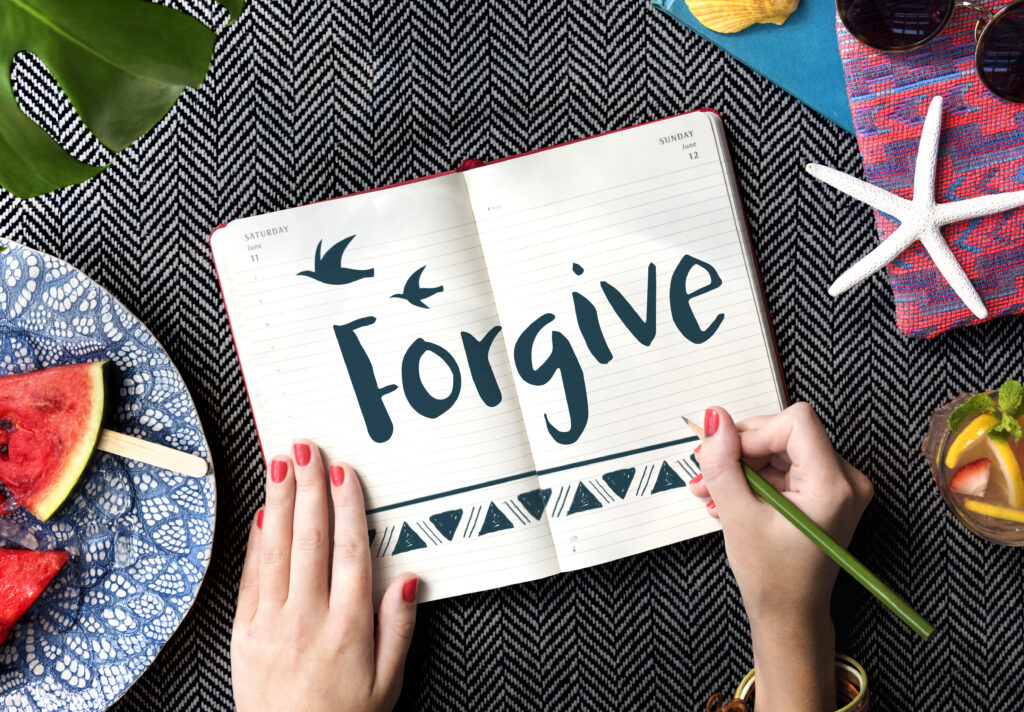Imagine carrying a heavy backpack filled with rocks, each one representing a past hurt, betrayal, or disappointment. That, my friends, is the burden of resentment. It weighs us down, steals our joy, and hinders our ability to move forward. But here’s the good news: forgiveness is the key to unlocking this burden and finding true inner peace.
For many, forgiveness is misunderstood. It’s not condoning the actions of another, pretending it didn’t happen, or becoming friends with someone who hurt us. Forgiveness is a personal journey, a decision we make for ourselves to release the grip of negativity and reclaim our emotional well-being.
Why Forgive? The Power of Letting Go
Imagine you’re carrying a backpack. Not just any backpack, but one filled with jagged rocks, each representing a past hurt, betrayal, or disappointment. Every step you take is a struggle, burdened by the weight of these emotional stones. That’s what holding onto resentment feels like. It’s a self-inflicted torture, poisoning your well-being while the person who hurt you walks free.
Forgiveness is the key to unlocking this emotional backpack and setting yourself free. It’s not condoning the hurtful actions, pretending they didn’t happen, or forcing a relationship with someone who wronged you. Instead, it’s a conscious choice to release the grip of negativity and reclaim your emotional power.
Here’s how forgiveness truly empowers you:
1. Stress Meltdown:
Ever feel like your mind is stuck on repeat, replaying that hurtful comment, or reliving that frustrating situation? That’s your stress hormone cortisol, acting like a mischievous monster wreaking havoc inside you. It makes your heart race, your muscles tense, and your thoughts jumpy. Not exactly the recipe for a calm and collected you!
But here’s the surprising part: research shows that forgiveness can lower your cortisol levels! It’s like taking off that heavy backpack and feeling instantly lighter. Your breathing becomes easier, your muscles relax, and that constant tension finally starts to fade.
2. Body Bliss:
The benefits of forgiveness go beyond the mind, impacting your physical health as well. Research suggests it can positively influence cardiovascular health, reducing the risk of heart disease and stroke. Better sleep becomes a reality, as forgiveness helps quiet the constant replay of negativity in your mind, leading to more restful nights and increased energy levels. Even chronic pain management can see improvement, as forgiveness can reduce the emotional component that amplifies physical discomfort.
3. Relationship Renaissance: From Walls to Bridges
Imagine a thick, invisible wall separating you from someone you care about. That’s what holding onto resentment can do – it creates distance and blocks communication. Forgiveness doesn’t magically erase the hurt, but it’s like chipping away at that wall, brick by brick. It allows you to see things from their perspective, understand their actions (without excusing them), and maybe even find a shred of compassion.
Remember that fight with your sibling? How did forgiveness allow you to talk things out, rebuild trust, and ultimately have a stronger bond? Now imagine applying that same healing power to all your relationships. Forgiveness opens the door to deeper connections, empathy, and genuine understanding, creating a true renaissance in your personal life.
4. Personal Powerhouse: From Baggage to Breakthrough
Picture yourself carrying a heavy suitcase filled with old, painful memories, resentments, and anger. It weighs you down, steals your energy, and limits your ability to move forward. Forgiveness is like setting that suitcase down, unpacking it, and examining its contents without judgment.
By releasing the emotional baggage, you create space for growth and positive change. It’s like clearing out a cluttered attic and finding hidden treasures – talents, strengths, and a renewed sense of self. You can learn from past experiences, develop healthier coping mechanisms, and build stronger, more authentic relationships.
Forgiveness isn’t about letting someone else off the hook; it’s about setting yourself free. It empowers you to become the architect of your happiness, one brick at a time. With each act of forgiveness, you choose to move forward, lighter, and more authentically you.
Forgiveness can be challenging. It’s a journey, not a destination, with moments of doubt and setbacks along the way. But remember, every step you take towards letting go is towards a lighter, healthier, and happier you. Embrace the power of forgiveness, unlock your inner peace, and start living a life truly free from the burden of resentment.
The Art of Forgiveness: A Guide for the Journey

Forgiveness isn’t a mountain you scale in a single heroic leap. It’s more like a winding path, sometimes steep and challenging, other times offering glimpses of breathtaking vistas. But with each step you take, you shed the weight of resentment and move closer to inner peace. Here’s a map to guide you on your journey:
1. Acknowledge the Wound:
Imagine you stumbled and scraped your knee. Ignoring the wound wouldn’t make it heal, right? The same is true for emotional hurts. Holding onto them hidden only festers the pain. Forgiveness starts with acknowledging the wound, no matter how sharp the sting. Don’t bury the hurt under a rug of denial. Sit with it, feel its sting, and name it. It isn’t about wallowing; it’s about acknowledging the reality of your pain. Writing down your feelings in a journal or expressing them to a trusted friend can be helpful.
2. Understand, Not Excuse:
Seek to understand the “why” behind the other person’s actions, without excusing their behavior. Were they driven by fear, insecurity, or a past hurt of their own? It doesn’t mean condoning their choices, but gaining perspective can lessen the emotional charge of the situation. Remember, understanding isn’t forgiveness; it’s simply trying to see the bigger picture.
3. Release the Reins:
We often cling to resentment because we expect apologies, amends, or even a complete overhaul of the other person. But true forgiveness doesn’t rely on external factors. It’s about letting go of the need for control and focusing on your healing. Imagine releasing a helium balloon carrying your anger and expectations – watch it drift away, carrying those burdens with it.
4. Embrace Self-Compassion:
Picture yourself carrying a heavy backpack filled with rocks, each representing a past hurt. Now imagine blaming yourself for the weight and exhaustion it causes. That’s what happens when we judge ourselves for feeling hurt or angry. It adds another layer of burden when you already struggle with past pains. Don’t beat yourself up for feeling hurt or angry. Holding onto resentment is a natural human response to pain. Forgive yourself for the time you’ve spent carrying this burden, and choose self-kindness as you move forward. Practice mindfulness techniques like meditation or deep breathing to cultivate self-compassion.
5. Seek a Support System:
You don’t have to navigate this journey alone. Talk to a therapist, counselor, or trusted friend who can offer a safe space to process your emotions and provide guidance. Consider joining a support group for people who have experienced similar hurts. Sharing your experiences can be incredibly validating and empowering.
6. Practice, Practice, Practice:
Forgiveness isn’t a one-time event; it’s a continuous practice. There will be setbacks, moments when anger resurfaces. That’s okay. Gently remind yourself of the benefits of forgiveness and the progress you’ve made. Each time you choose to let go, you strengthen your inner resilience and move closer to lasting peace.
Additional Tips:
Forgiveness is a personal journey, unique to each individual. Be patient with yourself, celebrate your progress, and trust that with each step, you’re creating a lighter, more fulfilling life.
Start Small:
Don’t feel pressured to tackle huge betrayals right away. Begin with minor annoyances or misunderstandings. Did a coworker borrow your stapler without asking? Forgive them! It might seem trivial, but each act of forgiveness strengthens your ability to let go.
Communicate with Care:
If you feel comfortable, expressing your hurt to the person who caused it can be helpful. Focus on how their actions impacted you (“When you did X, I felt Y”) instead of placing blame. Remember, this isn’t about demanding an apology, but simply sharing your truth.
Self-Care Serenade:
Healing takes time and tenderness. Nurture yourself with activities that bring joy and relaxation. Immerse yourself in nature, listen to calming music, or rediscover a forgotten hobby. Taking care of yourself creates a foundation for forgiveness to flourish.
Seek Professional Support:
If the burden of resentment feels overwhelming, don’t hesitate to seek professional help. A therapist or counselor specializing in trauma and forgiveness can provide a safe space to process your emotions and guide you on your healing journey. Remember, you don’t have to walk this path alone.
Practice gratitude.
Focusing on the good in your life can shift your perspective and make forgiveness more attainable. Take a moment each day to appreciate the people and things you’re grateful for, even amidst challenges.
Remember, forgiveness is a process, not an event. It takes time, patience, and self-compassion. There will be setbacks and moments of doubt, but with consistent effort, you can unlock the transformative power of forgiveness.


